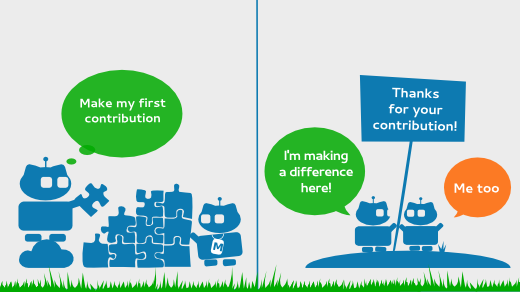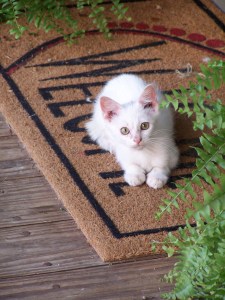
These days we are welcoming a new wave of candidates for Google Summer of Code and FOSS Outreach Program for Women (OPW) internships. Interested? Stop reading and hurry up! Or keep reading to learn why these free software mentorship programs are doing so much good.
Since 2006, Wikimedia has mentored 32 GSoC students. From those, only one (3.13%) was a woman (accepted in 2011), and she didn’t stick around. This number is even lower than the general percentage of women accepted in GSoC 2012 (8.3%) although perhaps it is in line with the composition of our own tech community (data missing). Can we do better?
We think we can. This is why we joined OPW last November. It was the first round open to organizations other than the GNOME Foundation, founders of the initiative. After 5 rounds of OPW, GNOME women are not an exotic exception anymore. It is too soon to evaluate results in the Wikimedia tech community, but the six interns we got during the 5th round delivered their projects in the areas of software development, internationalization, UX design, quality assurance and product management, and so far they are sticking around. We also learned some lessons that we are applying to the next internship programs. As we speak, several women are applying for Wikimedia in the current GSoC edition. A promising trend!
But there is more positive change. Paid internships are like subcutaneous injections for a free software community: in just one shot you get a full time contributor dedicated to help you within a defined scope and amount of time, with the incentive of a stipend ($5,000). The lives of the injected contributors change in the new environment. They learn and they adapt to new situations. They acquire a valuable experience that will help them becoming experienced volunteers and better professionals. At least this is the goal. But the life of the community receiving the injection also should change for good with the arrival of these full time contributors. This is also the goal. So what has improved so far in our tech community?
Scaling up complex projects
Mentorship programs require a good alignment of project ideas supported by the community and by available mentors. Thanks to the efforts of many, we have now a list of possible projects, including a selection of featured project ideas ready to start. The list includes proposals coming from different Wikimedia projects, Wikimedia Foundation-driven initiatives and MediaWiki features for third parties.
These project ideas link to Bugzilla reports in order to keep track of the technical discussion, involving the candidates, the mentors and whoever else wants to join. Full transparency! We also provide basic guidelines for candidates willing to propose their own projects.
All this has been done for the current GSoC and OPW round, but is potentially also useful in the context of other initiatives like OpenHatch, SocialCoding4Good, or Wikimedia’s Individual Engagement Grants. If you want to propose a technical project that could keep a person or team busy for 3–4 months, now you know where to start.
Improving our Welcome carpet

Each mentorship program brings a wave of newcomers willing to get up to speed as soon as possible. We are betting on the “the medium is the message” approach, giving as much importance to the proposals as to the participation and collaboration of the candidate in our regular community channels. But all this requires better landing surfaces in mediawiki.org.
This pressure and the repetition of similar questions by newcomers have encouraged the creation or promotion of references such as Where to start, How to contribute and Annoying little bugs. We keep working on an easier introduction to our community through the fresh and work-in-progress Starter kit, a team of volunteer Greeters and other initiatives discussed at the new Project:New contributors. And you know what? Several former interns are involved!
Diversity enters our agenda
We believe that “a healthy mix of demographic and cultural characteristics everywhere throughout the movement is key to Wikimedia’s success.” Diversity is good for creativity and sustainability, which are primary goals of any free software community. Yet diversity in these communities tends to be quite limited, and our case is not an exception.
We have mentioned the problem of male predominance, but there are other biases and types of discrimination that we would like to help leveling. What about working on other barriers caused by abilities, age, language, or cultural, ethnic, or economic background? Just like we are doing with OPW, we can start with programs for specific audiences that we can sync with mainstream activities like GSoC, increasing their diversity. Ideas are welcome.
Quim Gil, Technical Contributor Coordinator (IT Communications Manager)

Can you help us translate this article?
In order for this article to reach as many people as possible we would like your help. Can you translate this article to get the message out?
Start translation